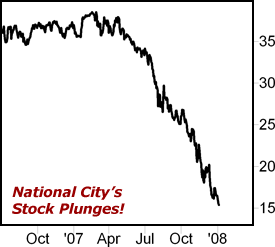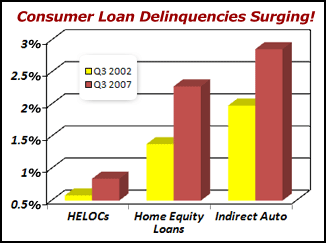US Financial Crisis Worsening as Consumer Loan Delinquencies Surge
Stock-Markets / Financial Crash Jan 04, 2008 - 10:41 AM GMT  Mike Larson writes: Several weeks ago, I told you we were staring "S&L Crisis II" in the face. I said estimates of losses stemming from the mortgage crisis kept spiraling higher — from $100 billion ... to $250 billion ... to $400 billion and higher.
Mike Larson writes: Several weeks ago, I told you we were staring "S&L Crisis II" in the face. I said estimates of losses stemming from the mortgage crisis kept spiraling higher — from $100 billion ... to $250 billion ... to $400 billion and higher.
I wish I could say things are getting better. But they're not. In fact, the tally of charges, losses and write-downs across the financial industry continues to rise higher and higher.
Just look what's happened in the past several days ...
National City (NCC) , the super-regional bank, said it will slash another 900 jobs, bringing the total number of cuts to 3,400 in the past year. It also cut its dividend in half— the first payout reduction since 1935. And it said residential mortgage volume would come in between $15 billion and $20 billion for 2008. The previous projection was $36 billion!

KeyCorp (KEY) said it would cease lending to many home builders and get out of the national home improvement lending business. The bank also announced charge-offs of about $110 million related to bum real estate development loans in markets like Florida and California ... and another $55 million to $65 million in losses stemming from commercial mortgage loan holdings.
State Street (STT) , an institutional money management firm, announced $279 million in charges for legal expenses and other mortgage-related costs. It's being sued by clients who claim the firm's asset managers racked up substantial losses on mortgage investments in supposedly low-risk funds. The head of State Street's investment unit also resigned.
Merrill Lynch (MER) , Citigroup (C) , and many other top financial firms have already announced billions of dollars of write-downs stemming from the collapse in the subprime mortgage market, as well as the sharp downturn in leveraged buyout activity and commercial real estate lending. Bloomberg pegged the total losses at a whopping $97 billion as of late 2007!
Now, with fourth-quarter earnings reports right around the corner, investors are bracing for even more. Goldman Sachs analysts expect another $34 billion in write-downs from top financial firms. Sanford C. Bernstein predicts that Citigroup will slash the value of its holdings by $12 billion, while Bank of America will fess up to a $5.5 billion charge.
But perhaps the most troubling news of all:
Consumer Loans Are Also Going Sour Left and Right!
Clearly, losses related to a bunch of "garbage" debt securities are piling up on Wall Street. But so are losses related to regular bread-and-butter loans.
Mortgage foreclosure rates are at the highest level ever. And this week, we got word that delinquencies are rising in almost every other consumer loan category, too.
According to the American Bankers Association:
![]() The delinquency rate on home equity loans rose to 2.28% in the third quarter from 1.79% a year earlier. That's the highest since the third quarter of 2005!
The delinquency rate on home equity loans rose to 2.28% in the third quarter from 1.79% a year earlier. That's the highest since the third quarter of 2005!
![]() The delinquency rate on home equity lines of credit (HELOCs) rose to 0.84% from 0.57%. That's the highest since the fourth quarter of 1997!
The delinquency rate on home equity lines of credit (HELOCs) rose to 0.84% from 0.57%. That's the highest since the fourth quarter of 1997!
![]() The delinquency rate on indirect auto loans (loans made through dealers) rose to 2.86% from 2.35%. That's the worst reading since the third quarter of 1991!
The delinquency rate on indirect auto loans (loans made through dealers) rose to 2.86% from 2.35%. That's the worst reading since the third quarter of 1991!
What's driving these increases?

First, the economy is weakening and job growth is slowing. The number of Americans continuing to collect jobless benefits is running around 2.76 million, the highest since October 2005. Another report from ADP Employer Services said U.S. companies added just 40,000 jobs in December.
Second, home values are declining. That's making it harder for consumers to refinance higher-cost car and credit card debt into lower-cost home equity loans. And it's giving more consumers an incentive to walk away from their homes — including their home equity debt — in the event of financial stress.
Third, rising short-term interest rates have driven the cost of servicing HELOC debt higher, just like they've driven the cost of servicing ARMs higher. Many HELOCs are tied to the prime rate, which closely follows the federal funds rate. As the Fed increased the funds rate, prime rose from 4% in 2004 to 8.25% in 2007. It has since fallen to 7.25%.
As a result of all these problems, leading U.S. banks have essentially been forced to beg for change from wealthy foreign countries. They're also considering asset sales to raise money!
Merrill Lynch went hat in hand to Asia, ultimately selling 9.4% of the firm to Singapore's government-backed investment fund Temasek Holdings for $4.4 billion. It's reportedly seeking even more money in the face of ever-larger write-downs.
Citigroup scored a $7.5-billion infusion from the sovereign wealth fund in Abu Dhabi. It's now reportedly mulling over the sale of its stake in Brazilian credit card issuer Redecard, its North American auto lending unit, or its Japanese consumer finance division.
Morgan Stanley sought out a $5-billion infusion from China Investment Corp.
And Bear Stearns sold a stake of 6% to China Securities.
There is nothing wrong with foreign investment in my book. But these events show you just how bad things have gotten in the U.S. financial industry right now.
The industry should have seen this coming, but they didn't. Fortunately, you were warned about these problems a long time ago.
I first alerted you about the ridiculously stupid lending going on in the residential mortgage market right here in Money and Markets way back in July 2006 .
I told you to expect borrowers owing more than their homes were worth ... a dramatic surge in foreclosures and other loan losses ... and outright bank failures. I also said:
"At best, you're going to see many sub-prime lenders, some banks, and investors in high-risk mortgage debt get their heads handed to them.
"At worst, we could have another crisis akin to the savings & loan crunch and commercial real estate busts of the late 1980s and early 1990s. Back then, reckless lending and wild interest rate moves caused huge bank failures — and ultimately led to a massive federal bailout costing more than $150 billion."
I followed up with a cautionary note on the private equity bubble in April 2007. And I talked about the nuttiness in the commercial real estate lending world in May. I told you that lenders, property owners, and landlords were being overly optimistic, and that they were going to get creamed. Today, that's exactly what's happening.
So, what comes next?
Get Ready for Even MORE Financial Sector Weakness!
I think we're going to see more multi-billion dollar profit warnings ... more capital infusions and bailouts from foreign firms ... and most likely, an early-2008 recession.
So invest accordingly — by avoiding most financial stocks and keeping a hefty chunk of cash in risk-free short-term Treasuries and other safe havens like gold.
It may also be time to check on the safety of your bank if you have substantial deposits that exceed FDIC insurance limits (generally $100,000 per depositor per insured bank). You can get more complete details on how FDIC coverage works here . Two firms that provide bank safety ratings are TheStreet.com and Bankrate.com.
We haven't had to worry about widespread bank failures for some time. And banks were fairly well-capitalized heading into this mess.
But the longer the mortgage and housing crisis drags on, and the higher delinquency rates and losses rise, the more risk there is to the health of the nation's banks.
So be proactive, assess your risk now, and move some money around if necessary.
Until next time,
Mike
This investment news is brought to you by Money and Markets . Money and Markets is a free daily investment newsletter from Martin D. Weiss and Weiss Research analysts offering the latest investing news and financial insights for the stock market, including tips and advice on investing in gold, energy and oil. Dr. Weiss is a leader in the fields of investing, interest rates, financial safety and economic forecasting. To view archives or subscribe, visit http://www.moneyandmarkets.com .
Money and Markets Archive |
© 2005-2022 http://www.MarketOracle.co.uk - The Market Oracle is a FREE Daily Financial Markets Analysis & Forecasting online publication.



